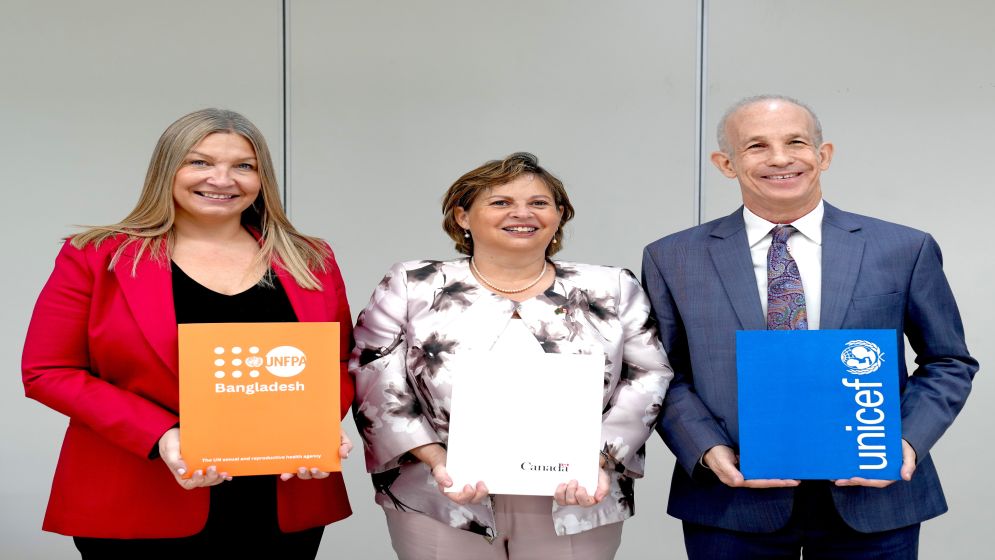Canada, UNICEF, and UNFPA join forces with Bangladesh to boost healthcare access for millions of women and children.

Canada, in partnership with UNICEF and UNFPA, has launched a five-year initiative to bolster primary healthcare systems in Bangladesh, focusing on improving maternal and child health outcomes in underserved rural areas.
The "Health System Strengthening for Primary Health Care" project aims to address critical gaps in healthcare access and quality in Kurigram, Bhola, Khagrachari, Sherpur, and Sunamganj districts.
Key project components include reinforcing healthcare systems at all levels, improving the Ministry of Health and Family Welfare's capacity, and ensuring gender-responsive and rights-based health services.
The project will also engage local communities in health planning and delivery to create more accountable and responsive healthcare services.
These efforts will specifically target over 1.9 million women of reproductive age, including two-thirds who are adolescent girls, and nearly 6 million children.
While Bangladesh has made strides in reducing maternal mortality rates, it still faces challenges in achieving the Sustainable Development Goal for maternal health by 2030. This project aims to further reduce preventable deaths due to conditions like hemorrhage and eclampsia by enhancing access to essential healthcare services.
The Canadian High Commissioner Dr. Lilly Nicholls emphasized Canada's commitment to improving healthcare in Bangladesh, particularly for women and girls.
She said, this project not only aims to improve health outcomes in the five districts but also to strengthen the healthcare system through better planning, resource allocation, and improved quality of care. “It is hoped that this project can serve as a model for other regions in the country,” she said.
Dr. Lilly affirmed Canada's dedication to enhancing healthcare in Bangladesh, particularly for women and girls.
She pointed out that adolescent girls in Bangladesh face heightened risks due to early marriage, gender-based violence, malnutrition, and limited access to sexual and reproductive health services.
With 35% of births occurring at home without skilled care, the project is crucial for mitigating risks for mothers and newborns, she added.
UNICEF Representative Sheldon Yett emphasized that this project not only saves lives but also establishes a sustainable healthcare system that empowers women and children, particularly adolescents.
By addressing the root causes of high maternal mortality, the project directly contributes to achieving critical Sustainable Development Goals for women's health, said the UNICEF representative.
Kristine Blokhus, UNFPA Representative in Bangladesh, acknowledged the progress made in maternal health but emphasized the need for continued efforts.
She stated, "This project is a collective endeavor to support the government in achieving the Sustainable Development Goal for maternal mortality. We must ensure that every pregnancy is desired and every childbirth is safe."
The project's immediate goal is to improve the quality, coverage, and gender-responsiveness of primary healthcare and sexual, reproductive, maternal, newborn, child, and adolescent health services.
This will focus on reaching marginalized and underserved populations, promoting women's empowerment, and encouraging community participation to uphold the rights of women, girls, and children.
Additionally, the project prioritizes environmental sustainability by addressing environmental impacts and reducing biomedical waste. This aligns with UNFPA's green procurement strategy and UNICEF's dedication to sustainable development, ensuring a holistic approach to improving health outcomes in Bangladesh.
—-

